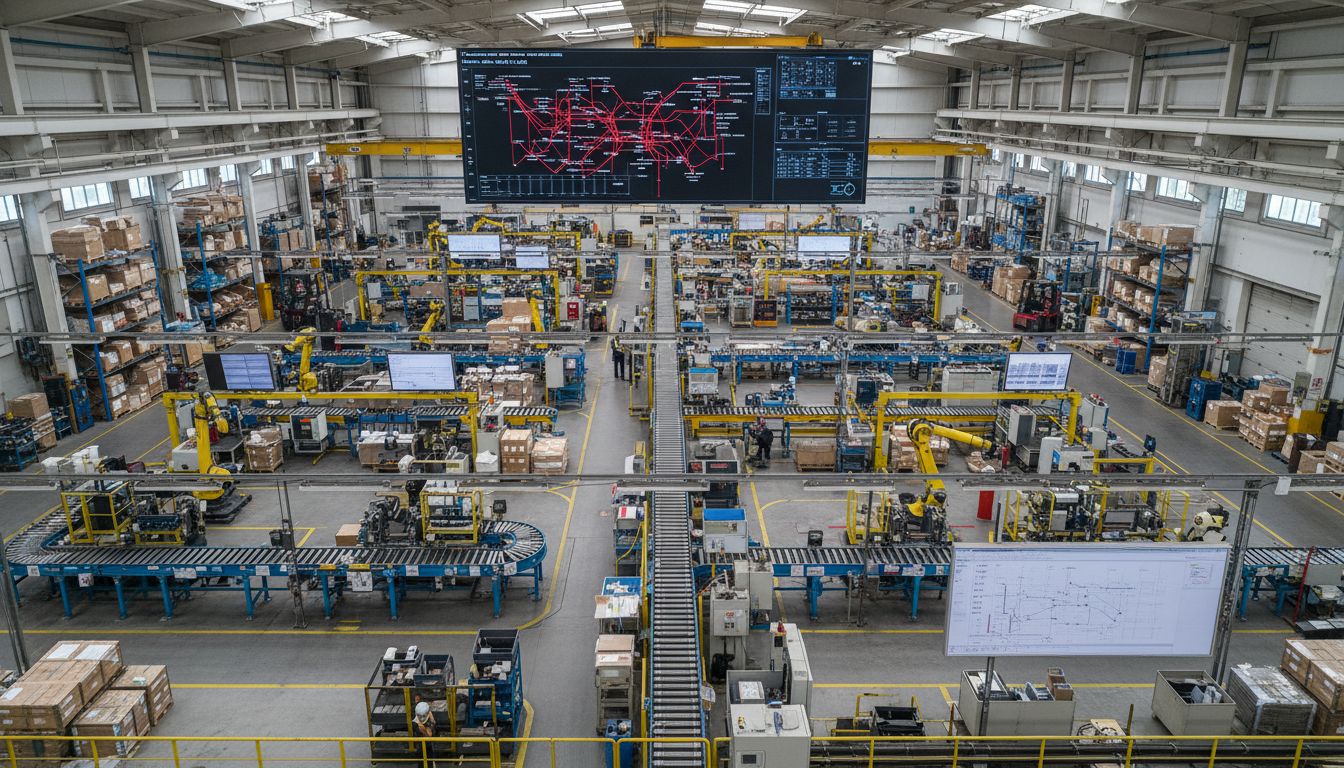Understanding the Role of AI in SMB Valuation

Knowing how much a small or medium business is really worth can shape every smart decision an owner makes. Now consider this. Businesses that use AI for valuation can identify hidden growth opportunities and risks faster than any traditional method ever could. Most assume valuation is just about crunching numbers, but AI is changing the whole approach. This new tech turns what used to be a simple financial snapshot into a dynamic prediction tool that can rewrite a business’s future.
Table of Contents
- The Significance Of Valuation For Small And Medium Businesses
- Defining Ai And Its Functionality In Business Contexts
- How Ai Enhances Accuracy In Smb Valuation Processes
- Assessing Risk And Opportunities With Ai Tools
- Real-World Applications And Case Studies Of Ai In Valuation
Quick Summary
| Takeaway | Explanation |
|---|---|
| Valuation informs strategic decisions. | Regular business valuation provides insights for key decisions, investment strategies, and long-term planning. |
| AI enhances valuation precision. | Advanced AI algorithms process complex data accurately, improving the quality of financial assessments. |
| AI identifies risks and opportunities. | Proactive AI tools can detect financial vulnerabilities and reveal growth opportunities that may be overlooked. |
| Dynamic models surpass traditional methods. | AI-driven valuations adapt to new data, offering more timely assessments than static, traditional approaches. |
| Real-world applications are transforming industries. | Businesses are successfully integrating AI in valuation processes, leading to improved financial insights and assessments. |
The Significance of Valuation for Small and Medium Businesses
Business valuation represents more than a financial exercise for small and medium businesses. It is a strategic compass that guides critical decision making, investment strategies, and long term planning. Understanding the true worth of a business provides owners with invaluable insights into their organization’s financial health and potential growth trajectories.
Why Business Valuation Matters
Valuation is not just about determining a monetary figure. It offers a comprehensive assessment of a company’s intrinsic value by examining multiple dimensions beyond simple revenue calculations. For small and medium businesses, this process helps illuminate:
- Current financial performance and market positioning
- Potential growth opportunities and strategic limitations
- Areas requiring operational improvements
By conducting regular valuations, business owners gain a transparent view of their enterprise’s strengths and potential vulnerabilities. Learn more about strategic business assessment to understand how comprehensive evaluations can transform business insights.
Key Components of Business Valuation
Effective business valuation integrates multiple analytical approaches. Financial experts typically consider three primary methodologies:
- Income Approach: Evaluates potential future earnings and cash flow generation
- Market Approach: Compares the business against similar companies in the industry
- Asset-Based Approach: Calculates total net asset value
Each methodology provides unique perspectives, helping business owners and potential investors understand the comprehensive economic potential of the enterprise.
The table below compares the three key business valuation methodologies, highlighting their core focus and typical use cases.
| Methodology | Core Focus | Typical Use Case |
|---|---|---|
| Income Approach | Future earnings and cash flow | Assessing profitability and forecasted business value |
| Market Approach | Comparison to industry peers | Evaluating value relative to similar businesses |
| Asset-Based Approach | Total net asset value | Summing up tangible and intangible business assets |
INFOGRAPHIC:infographic_content] According to [Harvard Business Review, precise valuation requires nuanced understanding of both quantitative metrics and qualitative business dynamics.
As artificial intelligence continues to transform business assessment techniques, small and medium businesses now have unprecedented opportunities to conduct more accurate and dynamic valuations. AI technologies enable more sophisticated data analysis, providing deeper insights into business performance and potential future scenarios.
Defining AI and Its Functionality in Business Contexts
Artificial Intelligence represents a transformative technological paradigm that enables machines to simulate human intelligence, learn from experiences, and perform complex tasks with increasing autonomy. For small and medium businesses, AI is not merely a technological trend but a strategic tool for enhancing operational efficiency and competitive advantage.
Core Characteristics of Business AI
AI systems in business contexts are characterized by their ability to process vast amounts of data, recognize patterns, and generate insights far beyond traditional computational methods.
This table outlines the core characteristics of AI in business, providing a clear overview of its primary capabilities and strategic benefits.
| Characteristic | Description |
|---|---|
| Data Processing Power | Analyzes vast and complex datasets at high speed |
| Pattern Recognition | Detects complex relationships and trends automatically |
| Predictive Insights | Anticipates market trends and business outcomes |
| Automation | Streamlines and automates routine decision-making tasks |
| Augmentation of Human Skills | Enhances the quality of business analysis and decisions |
- Analyze complex business data rapidly
- Predict potential market trends
- Automate routine decision making processes
Explore AI adoption strategies for business leaders to understand how these technologies can be strategically implemented.
Practical Applications of AI in Business Operations
Businesses across various sectors are integrating AI to solve critical challenges. According to Gartner Research, AI technologies are increasingly becoming central to operational strategies. These applications range from predictive analytics and customer service automation to advanced risk assessment and strategic planning.
The true power of AI lies not in replacing human intelligence but in augmenting human capabilities. By processing complex datasets and generating nuanced insights, AI enables business leaders to make more informed, data driven decisions. Intelligent systems can quickly identify patterns, predict potential outcomes, and provide recommendations that would take human analysts significantly more time to generate.
For small and medium businesses, AI represents an opportunity to level the competitive playing field. By implementing intelligent technologies strategically, organizations can optimize resources, enhance productivity, and develop more responsive business models that adapt quickly to changing market dynamics.
How AI Enhances Accuracy in SMB Valuation Processes
AI technologies are revolutionizing business valuation by introducing unprecedented levels of precision, speed, and comprehensive analysis. Small and medium businesses can now leverage advanced computational techniques to generate more nuanced and accurate financial assessments that go far beyond traditional valuation methodologies.
Precision Through Advanced Data Processing
AI algorithms excel at processing complex, multidimensional financial data with remarkable accuracy. These intelligent systems can simultaneously analyze multiple financial indicators, market trends, and historical performance metrics to generate more robust valuation models. Key advantages include:
- Eliminating human bias in financial assessments
- Processing exponentially larger datasets
- Identifying subtle financial patterns invisible to human analysts
Explore advanced AI business strategies to understand how technology transforms financial analysis.
Machine Learning and Predictive Valuation
Machine learning algorithms represent a quantum leap in business valuation techniques. By continuously learning from historical data and real time market information, these systems can generate increasingly sophisticated predictive models. According to research from the National Institutes of Health, AI powered financial models enhance predictability by integrating non traditional data sources and capturing dynamic market shifts.
Traditional valuation methods often rely on static snapshots of financial performance. In contrast, AI driven approaches create dynamic, adaptive models that can quickly incorporate new information, market trends, and emerging economic indicators. This allows small and medium businesses to receive more responsive and forward looking financial assessments that reflect the complex, interconnected nature of modern economic environments.
By embracing AI technologies, business owners can transform valuation from a retrospective accounting exercise into a strategic tool for understanding potential future scenarios and making more informed decisions.

Assessing Risk and Opportunities with AI Tools
AI tools have transformed risk assessment from a reactive process into a proactive strategic capability for small and medium businesses. By leveraging advanced predictive analytics and machine learning technologies, companies can now anticipate potential challenges and identify emerging opportunities with unprecedented precision and speed.
Comprehensive Risk Identification
Traditional risk management approaches often rely on historical data and human interpretation. AI tools revolutionize this process by analyzing multiple data streams simultaneously, uncovering complex risk patterns that might escape conventional analysis. These intelligent systems can:
- Detect potential financial vulnerabilities
- Predict market disruptions before they occur
- Generate probabilistic scenarios based on intricate data relationships
Discover how AI can future proof your business and transform your strategic planning approach.
Predictive Opportunity Detection
Beyond risk mitigation, AI tools excel at identifying emerging business opportunities. According to McKinsey Global Institute, advanced AI systems can analyze global market trends, consumer behavior shifts, and competitive landscapes to highlight potential growth vectors that traditional analysis might overlook.
AI driven opportunity assessment goes beyond simple data aggregation. These sophisticated algorithms can synthesize information from diverse sources, creating nuanced insights that enable businesses to make more informed strategic decisions. By processing vast amounts of structured and unstructured data, AI tools can reveal hidden market opportunities, potential partnership prospects, and innovative business models that might otherwise remain undiscovered.
For small and medium businesses, this represents a transformative approach to strategic planning. Instead of relying solely on intuition or limited market research, companies can now leverage AI powered insights to make more calculated, data driven decisions that minimize risk and maximize potential growth.
Real-World Applications and Case Studies of AI in Valuation
AI technologies have transitioned from theoretical concepts to practical business tools, demonstrating remarkable capabilities in transforming valuation processes across various industries. These real world implementations showcase the tangible benefits of integrating intelligent technologies into financial assessment strategies.
Startup and Technology Sector Implementations
Technology driven companies have been at the forefront of adopting AI powered valuation techniques. These organizations leverage machine learning algorithms to create more dynamic and precise company assessments. Key implementation strategies include:
- Utilizing predictive modeling for growth potential
- Integrating multiple data sources for comprehensive analysis
- Creating real time valuation dashboards
Learn about strategic AI implementation for business leaders to understand practical adoption approaches.
Financial Services and Investment Sector Transformations
According to PwC Research, financial institutions are increasingly deploying AI tools to enhance valuation accuracy and reduce assessment time. These intelligent systems can process complex financial information from multiple sources, providing more nuanced and comprehensive business assessments.
Investment firms and venture capital organizations are using AI to revolutionize traditional due diligence processes. By analyzing historical performance data, market trends, competitive landscapes, and potential growth trajectories, these tools provide unprecedented insights into a company’s true economic potential. Machine learning algorithms can identify subtle patterns and correlations that human analysts might overlook, enabling more informed investment decisions.
The convergence of AI technologies with financial valuation represents more than a technological upgrade. It signifies a fundamental shift in how businesses understand their economic value, potential risks, and growth opportunities. For small and medium businesses, this means access to sophisticated analytical tools that were previously available only to large corporations with extensive resources.
Unlock Accurate SMB Valuation With Practical AI Guidance
Discovering your company’s real value is more complicated than ever. Mistakes in valuation can cost growth opportunities and block your path to sustainable success. As revealed in our article, many small and medium businesses struggle to bridge the gap between traditional financial assessments and the advanced accuracy AI can offer. You may worry about relying on outdated methods or missing out on critical insights buried in complex data. That stress can be overwhelming.

Take control of your business narrative right now. At Average Robot, our AI consulting solutions are designed for business owners who need clear, actionable answers. Explore how our tailored approach delivers practical AI adoption strategies and proven future-proofing solutions that put trustworthy data at your fingertips. Do not let uncertainty hold you back. Start your journey to more precise and confident business valuation. Visit our site today and see how real intelligence drives real results.
Frequently Asked Questions
What is business valuation and why is it important for SMBs?
Business valuation is the process of determining the economic value of a business. It is crucial for SMBs as it provides insights into financial health, aids in decision-making, identifies potential growth opportunities, and helps in strategic planning.
How does AI enhance accuracy in SMB valuation processes?
AI enhances accuracy in SMB valuation by utilizing advanced data processing capabilities to analyze multiple financial indicators and market trends simultaneously. This leads to more precise and comprehensive financial assessments compared to traditional methods.
What are the key methodologies used in business valuation for SMBs?
The key methodologies include the Income Approach, which evaluates potential future earnings; the Market Approach, which compares the business to industry peers; and the Asset-Based Approach, which calculates the total net asset value of the business.
How can AI tools help in assessing risks and opportunities for small and medium businesses?
AI tools improve risk assessment by detecting potential vulnerabilities and predicting market disruptions through complex data analysis. They also identify emerging business opportunities by analyzing market trends and consumer behavior, enabling businesses to make informed strategic decisions.




